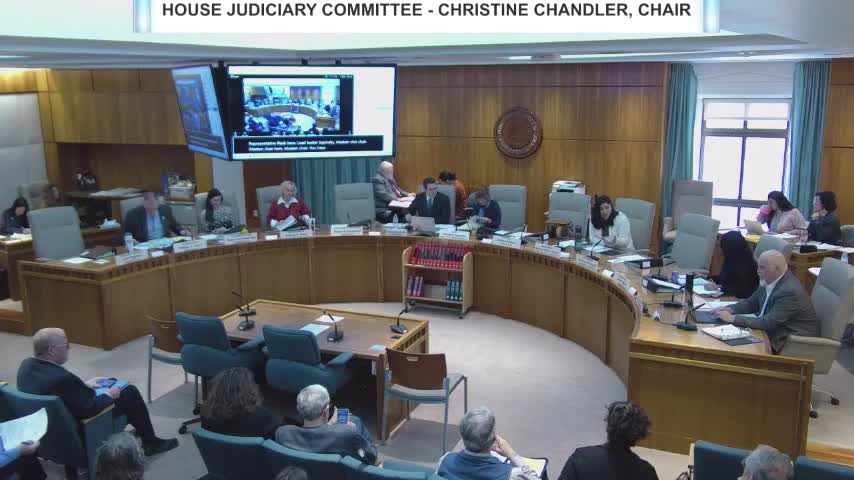House Judiciary committee advances bill requiring lobbyists to file activity reports within 48 hours
Get AI-powered insights, summaries, and transcripts
Subscribe
Summary
The House Judiciary Committee on Monday amended and granted a due pass recommendation for House Bill 143, a lobbying‑transparency measure that requires registered, paid lobbyists to file activity reports with the secretary of state within 48 hours after commencing lobbying on legislation during a session.
The House Judiciary Committee on Monday amended and granted a due pass recommendation for House Bill 143, a lobbying-transparency proposal that would require registered, paid lobbyists to file a lobbying activity report with the secretary of state within 48 hours after they begin lobbying on legislation during a legislative session.
The bill, carried by Representative Silva with Senator Seinborn as a cosponsor, would require a report that names a lobbyist’s employer and lists the specific bills or legislative matters the lobbyist is working to influence. Representative Silva described the measure as a targeted transparency step: “would require a lobbying activity report for, registered lobbyists, that lobby during the session,” she said. Senator Seinborn called the proposal “a super important bill for the increased transparency of the legislature,” and said the reports would be linked to the secretary of state website so the public and media could identify who is attempting to shape legislation.
Why it matters: Supporters said the bill gives lawmakers and the public a clearer view of interests shaping legislation. The measure does not require disclosure of expenditures or donations; sponsors said it requires only the employer name and the lobbyist’s stated position (support, oppose, neutral) on specific introduced bills. That information, sponsors said, would be posted online as a ledger so changes in a lobbyist’s position can be seen.
Key provisions and clarifications
- Report contents: The measure directs lobbyists who are required to register as lobbyists to file a lobbying activity report naming the lobbyist employer and the bills or matters they lobby on, and to indicate whether they support, oppose or are neutral on each listed bill.
- Timing and frequency: Sponsors originally described the filing timeframe as “as soon as practicable.” Committee members debated the phrase and approved an amendment—moved by Representative McQueen and seconded by Representative Sapanski—to require reports “within 48 hours after the commencement of the lobbying activity.” Sponsors said a lobbyist would file only once per position unless the lobbyist’s position changed, in which case a new report would be required.
- No dollar reporting: The bill does not require disclosure of money spent, campaign contributions, or other financial transactions; proponents said it is focused on activity and employer identification, not expenditures.
Public comment and support
Five in-person commenters and several online speakers voiced support. Disability advocate Nat Dean told the committee: “It is extremely helpful when someone states that they're a lobbyist and then name the organization they're a lobbyist for.” Barbara Califf, speaking as a registered lobbyist for the League of Women Voters of New Mexico, said the League stands “in strong support of HB 143” and thanked the sponsors for strengthening lobbying regulations. Youth activist Fennel Riley urged the committee to pass the bill so activists and small organizations could “know who is a lobbyist, who is an activist, and just to have more transparency.”
Member concerns and committee amendments
Committee members pressed sponsors on practical implementation. Representative Hall and Representative Martinez expressed concern about administrative burden and multiple filings if positions changed frequently; sponsors replied that the secretary of state would define filing intervals and that the bill’s 48-hour language was intended to prevent after-the-fact reporting that is not useful for legislative decision-making. Representative Romero referenced existing statutory filing thresholds and suggested a 48-hour interval as consistent with other reporting rules; the committee ultimately adopted the 48‑hour requirement.
Formal action
Representative McQueen offered an amendment to strike the clause requiring filing “prior to the adjournment of a legislative session” and tighten timing language; the amendment was discussed, amended on the floor of the committee to require filing within 48 hours after commencement of lobbying activity, and accepted as constructive/friendly. The committee then took a roll-call vote and gave HB 143 a due pass recommendation.
Votes at a glance
- Action: Amendment (require filing within 48 hours after commencement of lobbying activity) - Mover: Representative McQueen - Second: Representative Sapanski (initially), with Representative Spansky listed later as second on the combined amendment process - Outcome: Adopted (friendly/constructive)
- Action: Committee final vote on HB 143 (as amended) - Outcome: Due pass (advanced out of committee) - Recorded votes in transcript: Representative Abeyta — yes; Representative Hall — no; Representative Hartman Vigil — yes; Representative Martinez — no; Representative McQueen — yes; Representative Reeb — no; Leader Sapanski — yes; Vice Chair — yes; Chair — yes. (Transcript shows these named votes; other members’ recorded votes were not indicated in the hearing excerpt.)
What the record does not show
The committee adopted the timing and employer-disclosure language, but the transcript does not include the final codified draft text that will appear in the version sent to the floor. Sponsors said the secretary of state will prepare rules and the filing format.
Next steps
With the due pass recommendation, HB 143 is scheduled to move from committee to the next stage of the legislative process. Sponsors said they will continue to work with the secretary of state on implementation details and filing formats.
Ending
Supporters presented HB 143 as a limited, practicable transparency change focused on activity reporting and employer identification rather than financial disclosure. Opponents or skeptics in committee centered on administrability and how frequently lobbyists might have to update positions; sponsors and several members said a short filing window and a single-report-unless-position-changes rule were intended to limit burden while improving transparency.
